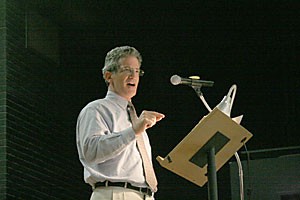Different religions must find a way to live together while retaining their own values, said Christian, Muslim and Jewish speakers at panel discussion attended by more than 150 last night.
“”I would hope that tonight’s discussion would bring some healing and a good interfaith dialogue,”” said Steve Kozachik, assistant director of athletics, facilities and event operations and organizer of the panel.
The discussion, “”Islam, Christianity, Judaism: Reflections on Fundamentalism, Orthodoxy and Community”” in the Modern Languages building auditorium, began with a 15-minute speech from each of the three representatives of the different faiths.
Ann Kozachik, Steve’s wife, said her husband had the idea to bring together Jason Caywood, director of Adult Ministries at St. Andrew’s Presbyterian Church, Rabbi Tom Locheim from Congregation Or Chadash, and Scott Lucas, a UA assistant professor of Near Eastern studies.
“”One day we were driving to Phoenix and he said, ‘Why can’t we just all talk?’ and that’s how it all began,”” Ann Kozachik said. “”It’s his baby.””
Shavkat Otaboyev, a Pima Community College student from Uzbekistan, said he came to learn more about faiths other than his own Muslim religion.
“”I want to learn more about Jesus,”” Otaboyev said. “”Some religions say he’s a prophet, some say he’s God.””
Each religious leader spoke about how his faith fits into a democratic society peacefully, touched on the history of his religion, spoke of the future of his faiths and explained his beliefs.
Caywood said no religion can prove itself, and all religions are based on faith alone.
But people of different religions should not be not be afraid to speak out about what they believe, as this is one of their rights as Americans, he said.
“”If you really believe something and it is good news to you, would you not share it?”” Caywood said. “”Why would that be offensive?””
People should also know where other beliefs come from so they can have intelligent conversation, Caywood added.
Locheim said members of the Jewish faith have suffered from 2,000 years of oppression despite the fact that they and those who persecuted them both worship the same God.
“”That we are all plugged into the same source is my fundamentalism,”” Locheim said.
Lucas said that as a Muslim, his idea of God is, “”God does not like those who do wrong,”” adding that the faith teaches patience and forgiveness.
Lucas said the vast majority of Muslims do not kill for their beliefs, and the group of militants that call themselves fundamentalists consist of a very tiny, though dangerous, group of Muslims.
After the speeches, people with mixed beliefs formed discussion groups.
“”It was nice to hear them all speak positively about one another’s religions,”” said Courtney Price, a pre-nursing freshman who considers herself non-denominational.
Price said she was hoping to hear more about the core beliefs of each religion than the 15 minutes allowed.









